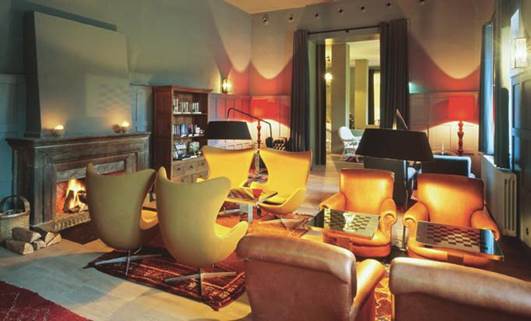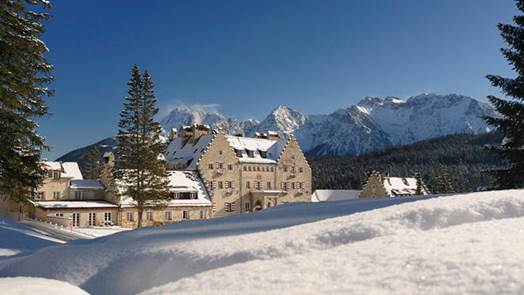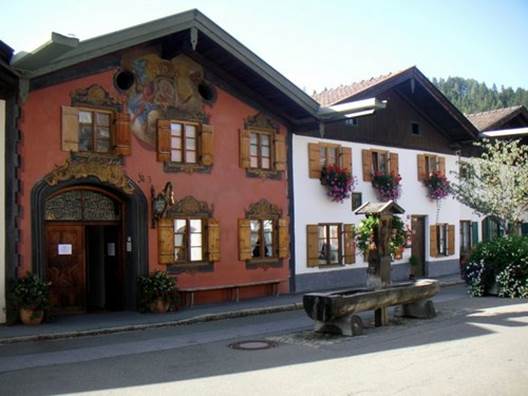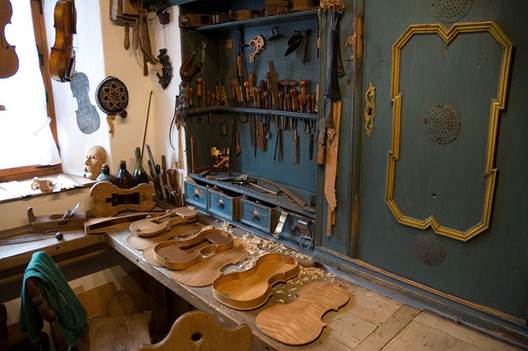A couple of hours later and I’m pulling
into Klais, which is right down near the Germany/Austria border having
travelled through some increasingly mountainous terrain along the way. The snow
has also increased considerably too and by now it has covered everything with a
generous layer of the white stuff. Amazingly, everything continues to function
as it should and people drive around looking relaxed enough so it’s time to
hail a taxi and head to my accommodation for the night. We went our way up the
mountain road, picking pour way past oncoming vehicles and gingerly around
corners that have enormous snow banks either side. About five minutes later, at
the end of a private road originally built by King Ludwig II to reach his
hunting lodge, the Hotel Kransbach comes into view and it’s quite something to
see.

Das
Kranzbach is a great place to shoot cool interior shots and designer room
layouts
There’s a whole story about how this place
came to be here and it’s an interesting one. The first thing you notice is that
the original old buildings could have been transported from a location in the
Scottish highlands. The other thing that you don’t notice, unless you’ve seen
the website beforehand, is that there is a whole other section of the hotel
which lies hidden, half-buried into the hillside that slopes gently away to the
right. Around this are the mountain, although you’re hard pressed to see them
when I arrive due to the persistent snow coming down. Heading inside, and Das
Kransbach is a real treat and the offer of a glass of sparkling wine and a seat
in front of the fire proves too hard to resist.

Das
Kranzbach, Bavaria
Das Kranzbach makes an ideal gateway
retreat for the delight that the mountains and countryside around here offer
up. However, dragging yourself away from the lure of the hotel is also quite hard
to do as it’s got wonderful swimming pools, wellness treatment centres plus a
restaurant and breakfast space that is second to none. It’s also a great place
to wander round taking photos if you’re into architecture and design, because
both the building and the furniture are really striking. You can stay in the
original part of the hotel, which is named after Mary Portman the English
aristocrat who commissioned the building in the early 1900’s and which was
built in 1915 by architect Detmar Blow. Or, alternatively, you can opt to stay
in the modern wood and glass wing that has been built into the side of the
hill. Either way, you’re in for a treat both in terms of relaxation and luxury
as well as being on the doorstep of some truly majestic picture-taking
territory, including the Zugspitze, the highest peak of the surrounding
Wetterstein Mountains at 2,962-metres above sea level.
Alpenwelt Karwendel/Mittenwald
The following morning I’m met by Claudia
Gans, a local guide who has lived here all her life and runs a local B&B,
so we head outside and into the snow again. She’s parked in a car park that’s
so deep in snow that I’m not entirely sure how she got into the space or, in
fact, how she’ll navigate her way out again. However, Bavarian’s here are used
to their snow and sure enough she deftly pulls the car from the drifting white
stuff and we head off along the private road. Initially, we actually go further
up the hill because Claudia has an additional imposing hotel to show me, the
Schloss Elmau, another luxury spa and cultural hideaway in the mountains.

The
Geigenbau Museum
After that slight diversion, we head back
down the hill via Klaus and drive to the neighbouring town of Mittenwald. This
too is on the railway line that runs into Austria and you can go onwards to
Innsbruck if the mood so takes you. However, for no Claudia takes me on a tour
of this enchanting town, which has a worldwide reputation for its violin
building. In fact, not only is there a really good museum (the Geigenbau
Museum) dedicated to this and other related stringed instruments, but there is
a college too, where students from all over the world study the fine craft of
building violins. It’s worth spending some time in Mittenwald because, even if
you don’t have the benefit of a proper guide like Claudia, each and every
corner reveals a new sight to see and that’s mainly in the shape of the
beautifully hand-painted buildings. The whole town is covered in these
colourful paintings and all tell their own story, sometimes of the family that
lives inside and in other cases, the design relates to historic events in this
very old location.

Geigenbau
Museum
The cold weather and lots of walking around
the town taking photos soon works up an appetite so we head to the Alpenrose,
fantastic old building that’s a traditional inn, complete with its very own
chapel inside. There’s ornate painting on the outside and a wonderfully
welcoming interior, plus the lure of traditional Bavarian cuisine and a very
large Weissbier to get through too. After that, it’s time to head back to the
station in Klais for my trip back to Munich so we trudge down the road, dodging
the very enthusiastic men with their snow ploughs and jump in the car. There’s
just time for a coffee (plus some delicious home-made cheesecake) at Rusticana,
the guesthouse and café run by Claudia who has proved very knowledgeable. At
the station, the train turns out to be 20 minutes late, which is a surprise
but, then again, considering the weather at the time it’s amazing there are any
trains at all.